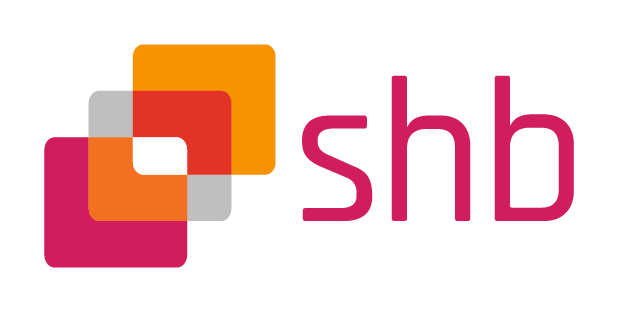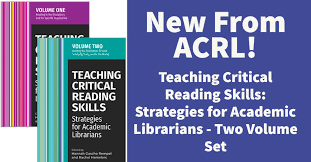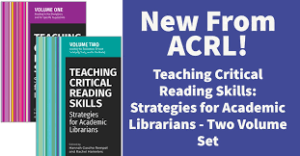Er is een nieuw boek op het gebied van het onderwijzen van kritische leesvaardigheden door academische informatiespecialisten uitgebracht door de ACRL: Teaching Critical Reading Skills: Strategies for Academic Librarians.
Het bestaat uit 2 delen en bevat de volgende hoofdstukken:
Volume 1
Introduction
Volume 1 — Reading in the Disciplines and Reading for Specific Populations
Hannah Gascho Rempel and Rachel Hamelers
Section I. Reading in the Disciplines
Chapter 1
Meeting Students in the Middle: Using Social Media Platforms and Contemporary Music Genres to Teach Critical Reading Skills for Primary Sources
Heather F. Ball
Chapter 2
Distant Reading as Library Pedagogy: Lessons for the Literary Studies Classroom
Amy Barlow
Chapter 3
Teaching a Reading Method for Scientific Research Articles: Transforming an Exercise from In-Person to Virtual Instruction
Roxanne Bogucka
Chapter 4
Medieval Medical School: A Primary Source Critical Reading Activity
Anna Dysert and Mary Hague-Yearl
Chapter 5
Teaching Students to Read and Critically Evaluate Scholarly Articles in Science and Agriculture
Chrissy Hursh
Chapter 6
Reading Scholarly Literature Across Academic Contexts: Tailoring Genre Approaches to Students’ Academic Year and Discipline
Chana Kraus-Friedberg and Emilia Marcyk
Chapter 7
Framing Reading as a Method in the Humanities
Elliott Kuecker
Chapter 8
Reading to Learn: A Collaborative Assignment to Build Critical Reading Skills in a First-Year Engineering Course
Jennifer Luarca and Hema Ramachandran
Chapter 9
Re-reading and Reflection: Steppingstones for Critical Readers in a College English Classroom
Amy Mallory-Kani and Hillary A. H. Richardson
Chapter 10
Reading Critically from the Archives: James Merrill Linn’s Diary as a Gateway to the Past
Courtney Paddick and Carrie Pirmann
Chapter 11
Using Professional Expectations to Improve Research and Reading Behaviors with Pre-Professional Health Students
Carolyn Schubert and Jennifer Walsh
Chapter 12
Navigating an Infodemic: Methods for Teaching Critical Reading in the Health Sciences
Candace Vance
Chapter 13
Critical Reading across the Engineering Disciplines
Dr. Kari D. Weaver, Dr. Kate Mercer, and Dr. Jennifer Howcroft
Section II. Reading for Specific Populations
Chapter 14
Supporting Early Undergraduate Students: Using Video to Introduce Critical Reading Skills in Scaffolded Information Literacy Instruction
Sarah Clark and Katherine J. Penner
Chapter 15
Critical Media Literacy Skills for Transfer Students
Margaret Dawson
Chapter 16
Librarians Sitting Down with Students: Varied Approaches to Co-Teaching Reading Skills for Developmental Writers
Lauren deLaubell, Dan Harms, Jenifer Sigafoes Phelan, and Hilary Wong
Chapter 17
Understanding Scholarly Articles: Teaching a Strategic Reading Method to Academically At-Risk Students
Kimberly T. Foster and Amy F. Fyn
Chapter 18
Surfacing Assumptions in Source Selection: Situating Critical Reading in First-Year Information Literacy Instruction
Anne Jumonville Graf
Chapter 19
Information Literacy Project in a First-Year Community College Reading Course: A Term-Long Journey
Pam Kessinger and Theresa Love
Chapter 20
Flexible, Not Flawless: Teaching Critical Reading Skills through a Bridge Program
Kayla M. Gourlay, Maoria J. Kirker, and Richard Todd Stafford
Chapter 21
Pulling It All Together: Teaching Genre, Disciplinary and Career Literacies, and the Framework for Information Literacy in an Associate Degree Capstone Course
Linda Miles and Lisa Tappeiner
Chapter 22
Reading Scholarly Articles and the First-Year Student: In-person and Online Instructional Strategies
Jo Angela Oehrli, Amanda Peters, and Alexander Deeke
Chapter 23
Connecting Critical Reading to the Literature Review: Teaching Qualitative Data Analysis Tools to Graduate Students
Lorelei Rutledge and Donna Harp Ziegenfuss
Chapter 24
A Librarian’s Role In Academic Reading Strategies for ESOL Students
Kathy Leezin Wu and G. Paige Sloan
Volume 2
Introduction
Volume 2 — Reading to Evaluate, Reading Beyond Scholarly Texts, and Reading in the World
Hannah Gascho Rempel and Rachel Hamelers
Section III. Reading to Evaluate
Chapter 25
Diving Below the Surface: A Layered Approach to Teaching Online Source Evaluation through Lateral and Critical Reading
Andrea Baer and Daniel G. Kipnis
Chapter 26
Critical Distance Reading: A Feminist Data Literacy Framework for Decolonizing Historical Memory
Frederick C. Carey and Nickoal Eichmann-Kalwara
Chapter 27
Developing Critical Reading Skills in Computing Disciplines Through a Social Justice Lens
Carmen Cole
Chapter 28
Textual Topographies: Equipping Students with Tools for Navigating Academic Writing
Stephanie Geller
Chapter 29
The PACT Instructional Model: Using Peritextual Analysis to Improve Reading Comprehension and Facilitate Critical Thinking
Melissa Gross, Don Latham, and Shelbie Witte
Chapter 30
Mapping Unfamiliar Territory: Using Guided Reading Charts to Navigate Sources
Jennifer Jarson
Chapter 31
Making Critical Reading Routine: Teaching Metacognitive Information Evaluation Using the Reading Apprenticeship Framework
Ryne Leuzinger and Jacqui Grallo
section iv. Reading beyond scholarly texts
Chapter 32
Defining Standards: How to Read and Teach Technical Standards
Jean L. Bossart
Chapter 33
More Than Meets the Eye: A Template for Workshops and Instructional Sessions to Enhance the Ability to Critically Read Images
Jodi Brown & Kaiya Ansorge
Chapter 34
Critically Reading Data: Interpreting Public Opinion Polls in the News
Halle Burns
Chapter 35
Critical Reading and Graphic Novels: Thinking Outside the Classroom
Sara C. Kern
Chapter 36
Reading Memes: Rhetorical Analysis of Memes as Multimodal Texts
Jenny Dale and Maggie Murphy
Chapter 37
Reading the Psychology Pre-Source: Scope Notes, Citations, Help Sheets, and More
Sala Rhodes Shierling and Dr. Rebecca Eaker
Chapter 38
Reading Images with a Critical Eye: Teaching Strategies for Academic Librarians
Dana Statton Thompson and Stephanie Beene
section v. reading in the world
Chapter 39
Promoting Critical Reading through Learner-Centered Design:
WI+RE’s Approach to Open Online Learning
Salma Abumeeiz, Christopher Lopez, Matthew Weirick Johnson, Kian Ravaei, Renee Romero, Hannah Sutherland, and Doug Worsham
Chapter 40
Creating a Skeptical Mindset: Helping Students Evaluate Statistical Claims in Popular Sources
Joshua Becker
Chapter 41
Complex Texts: Critically Reading Race and Representation in Picture Books
Jewel Davis
Chapter 42
Co-CREATE Your Class: Critical Reading Instruction for First-Year Students
Caitlan Maxwell and abby koehler
Chapter 43
Taking Back Reading: Lateral Reading and Fake News with First Generation College Students of Color
Jennifer Masunaga and Paizha Stoothoff
Chapter 44
Value in Disruption: A “Reading is Research” Pedagogy for Library Instruction
Catherine Tingelstad and Stephanie Otis
Chapter 45
According to Science: Critically Examining Media Reports of Primary Research
Kaitlin Springmier, Caitlin Plovnick, and Hilary Smith



